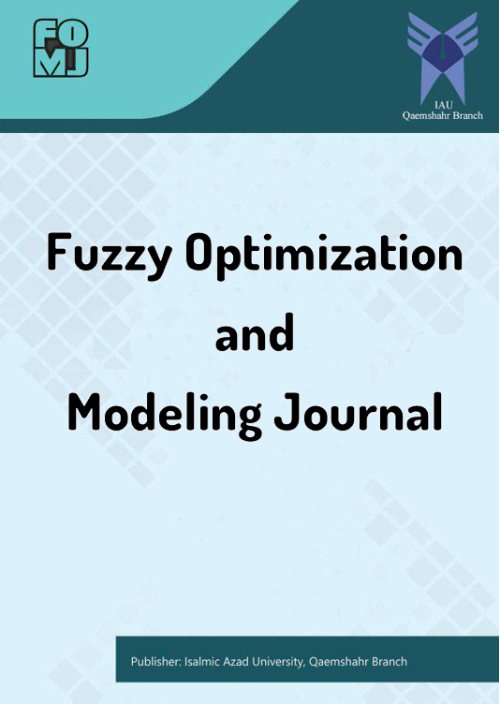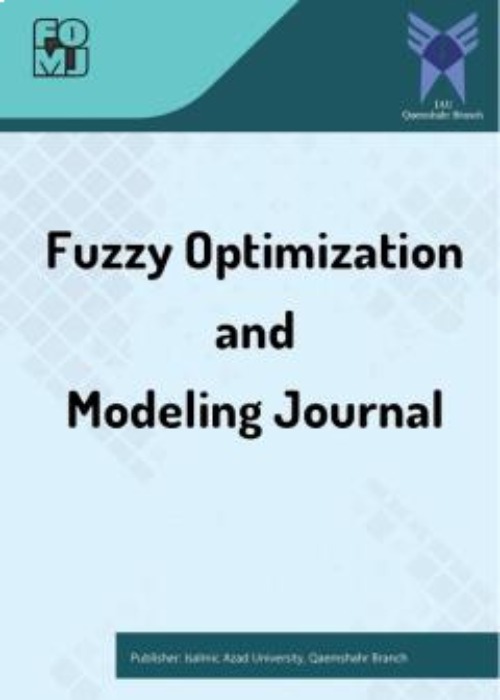فهرست مطالب

Fuzzy Optimzation and Modeling
Volume:3 Issue: 3, Summer 2022
- تاریخ انتشار: 1401/09/08
- تعداد عناوین: 6
-
-
Pages 1-18Portfolio construction and achieving the set of securities with the most desirability is one of the most critical problems in financial markets. Generally, there are two types of financial problems in literature, choosing the right stock portfolio from a set of possible options which is called portfolio selection, and calculating the portion of the purchase for each option which is called Portfolio optimization. In this paper, a new two-phase robust portfolio selection and optimization approach is proposed to deal with the uncertainty of the data. In the first phase of this approach, all candidate stocks’ efficiency is measured using a data envelopment analysis (DEA) method. Financial criteria for evaluation chosen from fundamental perspectives. Then in the second phase, by applying the Fuzzy Weighted Goal programming (FWGP) model with criteria related to modern portfolio theory (return and risk) as well as the mentioned criteria, the portion of investment in each qualified stock is determined and the optimal investment portfolio is formed. Finally, the proposed approach is implemented in a real case study of the Dow Jones Industrial Market (DJIA). The resulting portfolios for the proposed models are compared against each other as well as against the Dow Jones Industrial Average index. The results show that for the data used and factors investigated some of the constructed portfolios, with a much smaller number of constituents, could potentially outperform DJIA in terms of their performance.Keywords: Portfolio optimization, Fundamental Analysis, goal programming, Fuzzy uncertainty, Data envelopment analysis
-
Pages 19-32In this study, we consider solving the second kind Volterra fuzzy integral equations system in two cases linear and nonlinear by using a semi-analytic method, called Differential Transform Method (DTM). In this algorithm the first, we convert a Volterra fuzzy integral equations system into two crisp integral equations systems of Volterra; then we solve each of them via DTM. If the equation has a solution in terms of the series expansion of known functions; this powerful method will catch the exact solution. Moreover, the ability and efficiency of the algorithm are shown by solving some numerical examples.In this study, we consider solving the second kind Volterra fuzzy integral equations system in two cases linear and nonlinear by using a semi-analytic method, called Differential Transform Method (DTM). In this algorithm the first, we convert a Volterra fuzzy integral equations system into two crisp integral equations systems of Volterra; then we solve each of them via DTM. If the equation has a solution in terms of the series expansion of known functions; this powerful method will catch the exact solution. Moreover, the ability and efficiency of the algorithm are shown by solving some numerical examples.Keywords: Fuzzy Integral Equations System, Volterra Integral, Differential transform method, Error estimation
-
Pages 33-48In the last two years (2020 and 2021), many businesses, especially in the tourism and pilgrimage sectors, suffered severe recession during the COVID-19 pandemic. The closure of many hotels in the world's religious cities has posed a major threat to religious tourism. Meanwhile, Mashhad hotels in Iran, which are demanded by many tourists and pilgrims from neighboring countries of Iran, were the most affected by this pandemic. Therefore, attracting tourists by observing health protocols for prosperity Industry is very important. Given the complexity of the issue, creativity and the use of decision-making techniques to prioritize marketing strategies are particularly important. This study aims to prioritize marketing strategies using the FMCDM techniques and compare their results together for hotels in the world's second-largest religious metropolis during the COVID-19 pandemic. Therefore, two approaches were applied using the combination of the FAHP technique with distance-based FMCDM methods. Distance-based techniques including FTOPSIS and FVIKOR were used. Based on the FTOPSIS, a strategy with an emphasis on focused differentiation was selected as the most appropriate marketing strategy. By applying the FVIKOR method, three strategies were selected as the best strategies. Two of these three strategies emphasize focused differentiation and the other emphasizes differentiation.Keywords: Distance-Based Fuzzy MCDM, Marketing Strategy, Tourism-Pilgrimage Hotels, Covid-19 pandemic
-
Pages 48-58Rough set theory expresses vagueness, not by means of membership, but employing a boundary region of a set. If the boundary region of a set is empty, it means that the set is crisp. Otherwise, the set is rough. Nonempty boundary region of a set means that our knowledge about the set is not sufficient to define the set precisely. In this paper, a rough programming (RP) problem is introduced where a rough function concept and its convexity and differentiability depending on the boundary region is studied. The RP problem is converted into two subproblems namely, lower and upper approximation problem. The Kuhn-Tucker. Saddle point of rough programming problem (RPP) is discussed. In addition, in the case of differentiability assumption the solution of the RP problem is investigated A numerical example is given to illustrate the methodology.Keywords: Convex function, Convex rough function, Differentiable rough function, Nonlinear programming problem, Kuhn- Tucker's Optimal Saddle Point
-
Pages 59-78In this paper, we consider the issues related to multi-periodic and multi-period routing and positioning, and investigate the relevant constraints. Those decisions on location allocation, inventory and routing are made in a three-tiered supply chain, including suppliers, warehouses and customers. We seek new ways to decide on location and routing simultaneously and efficiently. To maximize the search space and to achieve optimum results, heuristic and meta-heuristic methods have been used. The meta-heuristics technique is usually used to increase the performance of the combination technique. Therefore, this article provides an overview of meta-heuristic methods and their combinations to solve problems. It also examines the advantages and disadvantages of the proposed methods to solve these problems in order to provide more efficient methods.Keywords: Fuzzy values, meta-heuristic, Hybridization, Memetic Algorithm
-
Pages 84-92
Data envelopment analysis (DEA) is a method to estimate a relative efficiency of decision making units (DMUs) performing similar tasks in a production system that consumes multiple inputs to produce multiple outputs. The original DEA model does not include a decision maker’s (DM’s) preference structure while measuring relative efficiency. Regarding to relationship between DEA and multiple objective linear programming (MOLP) this paper propose a method based on fuzzy goal programming to incorporate DM’s wishes in evaluation of DMUs then it analyzes the situations that the input-output levels of the estimated benchmark will not or may worsen. A compromised method is suggested that not only considers DM’s wishes in target setting but also improve the efficiency of DMUs while none of input-output levels deteriorate.
Keywords: Data envelopment analysis, goal programming, Fuzzy programming, Target setting


